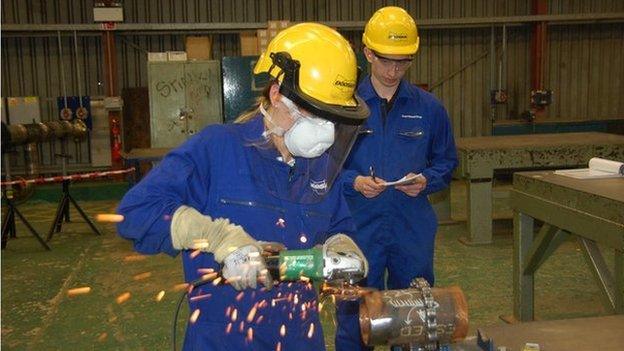Labour pledges face-to-face careers advice in schools
- Published

Labour says its plan will include information about high-quality apprenticeships and technical degrees
Teenagers in England will be guaranteed face-to-face individual careers advice if Labour forms the next government.
The party's education manifesto , externalalso includes a pledge "to protect the entire education budget in real terms".
"A world-class education is a not a luxury, but a necessity," said Labour leader Ed Miliband.
For the Conservatives, Education Secretary Nicky Morgan said Labour had not set how the new careers service would be funded.
"So it would either put pressure on school budgets or lead to more borrowing and more spending," said Mrs Morgan.
'Right advice'
Labour says its plan would focus on vocational as well as on academic routes into careers, with the aim of raising standards and increasing opportunities for all young people.
The new proposals would cost approximately £50m and would be funded and supported through a partnership between universities, schools, colleges and employers, says Labour.
The party quotes the CBI as having described careers advice in schools as being on "life-support".
Too many schools offer inadequate careers advice, says Labour, often just pointing pupils towards online information.
The party says this follows "years of neglect and reductions in support under David Cameron and the Tories".
Labour promises:
Guaranteed face-to-face advice from careers advisers, from age 11
Advice about high-quality apprenticeships and technical degrees alongside traditional academic routes to university
Schools to be held to account for their careers advice
To reverse the coalition government's decision to scrap compulsory work experience for 14- to 16-year-olds.
The party says the proposals build on its existing plans for a Technical Baccalaureate, compulsory English and maths to 18 and an apprenticeship offer for every school leaver who gets the grades.
Education
Labour
Main pledges
- Protect education budget for 0-19 year olds so it rises in line with inflation
- Cut university tuition fees to £6,000 a year
- Ensure all primary schools guarantee access to childcare from 8am to 6pm
- Cap class sizes at 30 for 5, 6 and 7 year-olds

"Young people must be equipped with the right skills, the right knowledge and the right advice they need to succeed," said Mr Miliband.
"Failure to do this will not only cheat our young people of a decent future, it will cheat our country too."
Labour's education manifesto also includes commitments to smaller classes in infants' schools, a qualified teacher in every classroom and local directors of school standards "to tackle underachievement".
Employer links
In December, Mrs Morgan announced £20m to set up a new careers company to forge links between schools and businesses in England.
This followed concerns that careers advice had deteriorated after schools took over responsibility for it from local councils in 2012.
Mrs Morgan says Labour's alternative does not add up.
"Once again the chaotic Labour Party have shown they don't have a plan for education.
"The Conservatives have already introduced a careers company properly backed up by industry, qualifications valued by employers and given young people the skills they need to go achieve in life and build a secure future.
"Only the Conservatives can ensure our young people have the world-class skills they need."
The Conservatives announced details of their education policies on Wednesday, including re-sits for pupils who get poor results in tests at the end of primary school.
The Liberal Democrats maintain that the pupil premium, which they championed in the coalition government, is the key to increasing fair access to opportunities for teenagers.
The premium is paid to schools for every pupil they have who is eligible for free school meals.
The National Union of Students said face-to-face careers advice was "essential" to help people "fully explore their options".
NUS president Toni Pearce said she welcomed Labour's commitment "wholeheartedly".
CBI deputy director general Katja Hall said too many young people were unable to access reliable information to make the right decisions for their futures.
"Ensuring businesses are at the heart of inspiring young people is welcome, but we need to know how these changes will interact with the new 'Careers Company'," she said.
'Misgivings'
The National Association of Head Teachers agreed all children should have access to high-quality careers advice, from primary school onwards.
The union said its Primary Futures, external project already put "professional people into primary schools to showcase the world of work".
But the Association of School and College Leaders, which primarily represents secondary heads, expressed "serious misgivings over Labour's approach", particularly over the suggestion that careers advisers would be employed centrally rather than directly through schools.
"The needs of young people in different parts of England vary enormously and cannot be met from Westminster," said ASCL general secretary Brian Lightman.
The charity Barnardo's added that it was vital to ensure that training options for disadvantaged young people with low qualifications were included in any new careers service.
- Published2 March 2015

- Published2 February 2015

- Published7 January 2015

- Published10 December 2014
